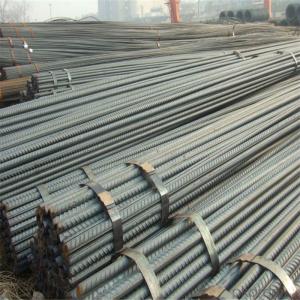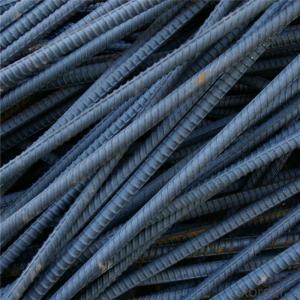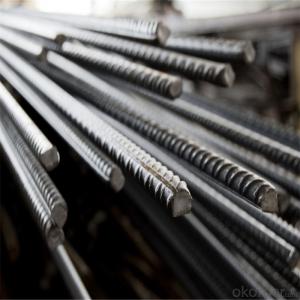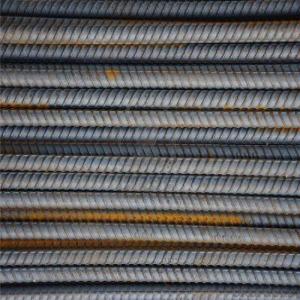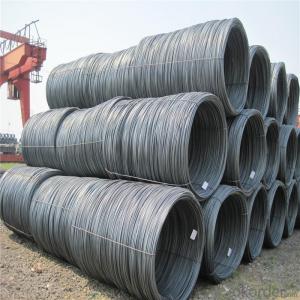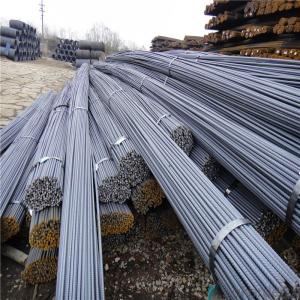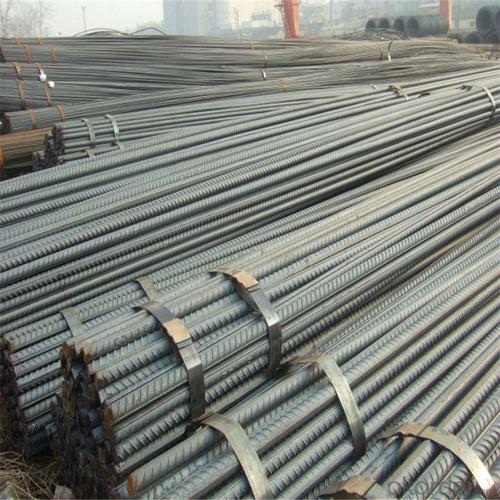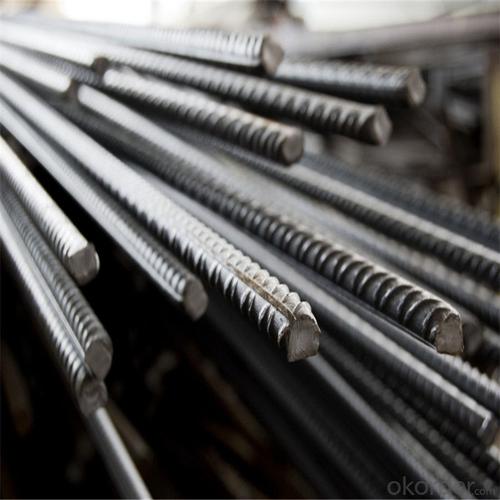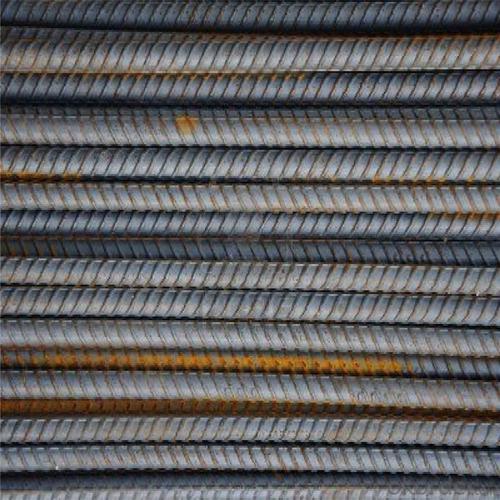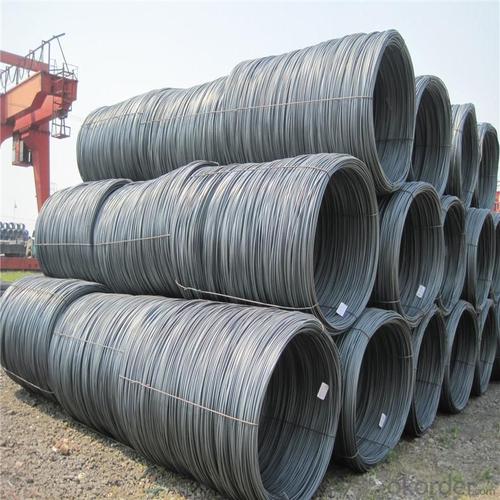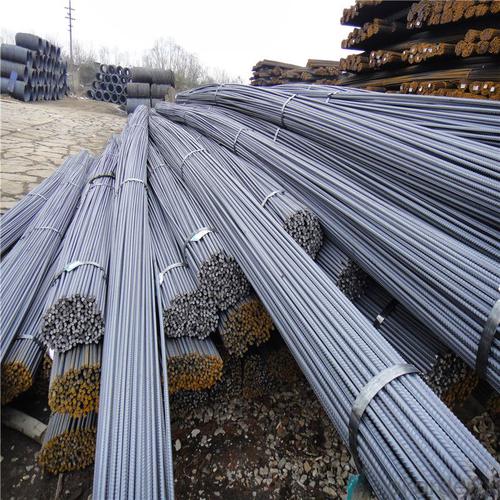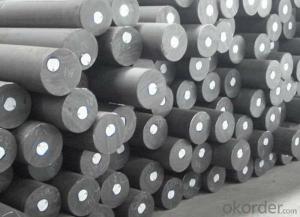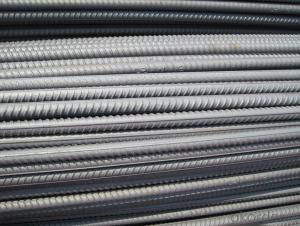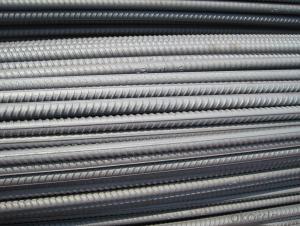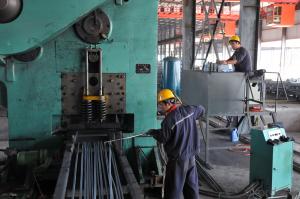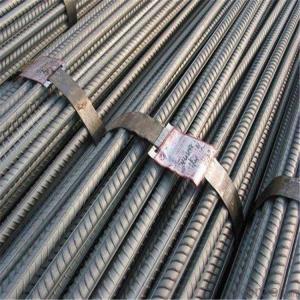Bs4449 Grade460 Deformed Steel Rebar
- Loading Port:
- Tianjin
- Payment Terms:
- TT OR LC
- Min Order Qty:
- 110 m.t.
- Supply Capability:
- 500000 m.t./month
OKorder Service Pledge
OKorder Financial Service
You Might Also Like
Specification
Bs4449 Grade460 Deformed Steel Rebar
Description of Bs4449 Grade460 Deformed Steel Rebar
1, Diameter: 5.5mm-10mm Bs4449 Grade460 Deformed Steel Rebar
10m- 40mm Bs4449 Grade460 Deformed Steel Rebar
2, Length: 6m, 9m, 12m or customized
3, Standard: GB, ASTM, AISI, SAE, DIN, JIS, EN
OEM technology - send detailed technical parameters for accurate quotation.
2, Produce Process: smelt iron - EAF smelt billet - ESR smelt billet -
hot rolled or forged to get the steel round bar and plate
3, Heat Treatment: annealing, normalizing, tempering, quenching
4, Surface Treatment: Black
5, Quality Assurance: We accept third party inspection for all orders.
You can ask testing organizations such as SGS, BV, etc. to test our products before shipping.
Chemical Composition of Bs4449 Grade460 Deformed Steel Rebar
Grade | Technical data of the original chemical composition(%) | |||||
Reinforcing steel bar HRB335 | C | Mn | Si | S | P | B |
≤0.25 | ≤1.60 | ≤0.80 | ≤0.045 | ≤0.045 | >0.0008 | |
Physics Capability | ||||||
Yield Strength(N/cm2) | Tensile Strength(N/cm2) | Elongation(%) | ||||
≥ 335 | ≥490 | ≥16 | ||||
Reinforcing steel bar HRB400 | C | Mn | Si | S | P | B |
≤0.25 | ≤0.16 | ≤0.80 | ≤0.045 | ≤0.045 | 0.04-0.12 | |
Physics Capability | ||||||
Yield Strength(N/cm2) | Tensile Strength(N/cm2) | Elongation(%) | ||||
≥ 400 | ≥ 570 | ≥ 14 | ||||
Products Show of Bs4449 Grade460 Deformed Steel Rebar
Company Information
CNBM International Corporation is the most important trading platform of CNBM group.
Whith its advantages, CNBM International are mainly concentrate on Cement, Glass, Iron and Steel, Ceramics industries and devotes herself for supplying high qulity series of refractories as well as technical consultancies and logistics solutions.


F A Q
1, Your advantages?
professional products inquiry, products knowledge train (for agents), smooth goods delivery, excellent customer solution proposale
2, Test & Certificate?
SGS test is available, customer inspection before shipping is welcome, third party inspection is no problem
3, Factory or Trading Company?
CNBM is a trading company but we have so many protocol factories and CNBM works as a trading department of these factories. Also CNBM is the holding company of many factories.
4, Payment Terms?
30% TT as deposit and 70% before delivery.
Irrevocable L/C at sight.
5, Trading Terms?
EXW, FOB, CIF, FFR, CNF
6, After-sale Service?
CNBM provides the services and support you need for every step of our cooperation. We're the business partner you can trust.
For any problem, please kindly contact us at any your convenient time.
We'll reply you in our first priority within 24 hours.
- Q: How does special steel perform in high-speed machining operations?
- Special steel is designed with high-speed machining operations in mind, as it possesses unique properties that make it perfect for cutting, drilling, and shaping at high speeds. To begin with, special steel boasts excellent thermal conductivity, enabling it to effectively dissipate heat generated during machining. This is crucial in high-speed operations, as excessive heat can result in tool wear and deformation. By efficiently transferring heat away from the cutting edge, special steel helps prolong tool lifespan and maintain dimensional accuracy. Additionally, special steel exhibits high hardness and strength, enabling it to withstand the intense forces and pressures encountered during high-speed machining. This allows it to retain its shape and integrity, reducing the likelihood of tool breakage or deformation. Furthermore, its strength ensures that the machined parts possess exceptional durability and resistance to wear. Moreover, special steel demonstrates good machinability, making it easy to cut and shape with minimal effort. Its composition and microstructure are optimized for efficient chip formation and removal, ensuring smooth operations and minimizing the risk of chip clogging or tool jamming. Furthermore, special steel often contains alloying elements like chromium, molybdenum, and vanadium, which enhance its resistance to corrosion and wear. This is particularly important in high-speed machining, where the cutting tools and workpiece are in constant contact. The improved corrosion and wear resistance of special steel contribute to longer tool lifespan and improved surface finish. In summary, special steel is engineered specifically to excel in high-speed machining operations. Its thermal conductivity, hardness, strength, machinability, and resistance to corrosion and wear make it the preferred choice for applications that demand fast and precise metal removal.
- Q: How does special steel contribute to the energy generation industry?
- Special steel plays a crucial role in the energy generation industry by contributing to the efficiency, reliability, and safety of various components and equipment used in power plants. One key area where special steel is essential is in the construction of turbine blades and generator rotors. These components are subjected to extreme temperatures, pressures, and mechanical stresses. Special steels, such as superalloys, are specifically designed to withstand these harsh conditions, ensuring the longevity and performance of these critical parts. By using special steel, power plants can operate at higher temperatures and pressures, leading to increased energy efficiency and power output. In addition to turbine components, special steel is also used in the construction of boilers and heat exchangers. These components are exposed to high temperatures and corrosive environments. Special steel alloys, such as stainless steels, are highly resistant to corrosion and can withstand the harsh conditions encountered in power plant operations. This corrosion resistance ensures the longevity and reliability of these components, reducing maintenance costs and downtime. Furthermore, special steel is utilized in the construction of transmission and distribution infrastructure. Steel cables and conductors are used to transmit electricity over long distances, and special steel alloys provide the necessary strength and conductivity for efficient power transmission. Additionally, steel is used in the construction of towers, poles, and other support structures, ensuring the stability and reliability of the electrical grid. Moreover, special steel is also vital in the production of nuclear energy. Nuclear power plants require materials that can withstand extreme temperatures, high radiation levels, and corrosive environments. Special steel alloys, such as stainless steels and nickel-based alloys, are specifically designed to meet these requirements, providing the necessary strength, resistance to radiation, and corrosion resistance for the safe and efficient operation of nuclear reactors. In summary, special steel is an integral part of the energy generation industry. Its unique properties and capabilities contribute to the efficiency, reliability, and safety of various components and equipment used in power plants. By using special steel, power plants can increase energy efficiency, reduce maintenance costs, and ensure the longevity and performance of critical infrastructure, ultimately supporting the sustainable and reliable generation of electricity.
- Q: How does special steel contribute to the automotive racing industry?
- Special steel contributes to the automotive racing industry by providing high-strength and lightweight materials that enhance the performance and safety of race cars. These steel alloys are used in various components, such as engine parts, chassis, and suspension systems, allowing for improved speed, maneuverability, and durability. Additionally, special steel's exceptional heat resistance and ability to withstand extreme conditions make it vital for engines that generate immense power and operate at high temperatures. Overall, special steel plays a crucial role in pushing the boundaries of automotive racing technology and enabling teams to achieve optimal performance on the track.
- Q: What are the different methods for improving the electrical conductivity of special steel?
- There are several methods for improving the electrical conductivity of special steel, including alloying, heat treatment, and surface modifications. Alloying involves adding elements like copper, nickel, or silver to the steel to enhance its conductivity. Heat treatment processes such as annealing or quenching can also improve conductivity by altering the microstructure of the steel. Additionally, surface modifications like electroplating or coating can be employed to enhance electrical conductivity.
- Q: What are the different types of welding techniques used for special steel?
- There are several types of welding techniques used for special steel, including TIG (Tungsten Inert Gas) welding, MIG (Metal Inert Gas) welding, Stick welding, and Flux-cored arc welding. These techniques are commonly used for welding special steel due to their ability to provide strong and precise welds, ensuring the integrity and durability of the material.
- Q: How is tool and die steel used in the manufacturing of molds and dies?
- Tool and die steel is used in the manufacturing of molds and dies because of its high hardness, wear resistance, and toughness properties. It is used to create and shape various components of molds and dies, such as inserts, cavities, and cores, which are crucial in the production of plastic, metal, or other materials. Additionally, tool and die steel also provides the necessary strength and durability to withstand the high pressure, heat, and repeated use involved in the manufacturing process.
- Q: How does special steel perform in pharmaceutical applications?
- Special steel performs well in pharmaceutical applications due to its excellent corrosion resistance, high strength, and ability to withstand extreme temperatures. It ensures the integrity and purity of pharmaceutical products by preventing contamination, thereby maintaining the quality and safety of drugs. Additionally, special steel's ease of cleaning and sterilization makes it an ideal choice for pharmaceutical equipment and machinery.
- Q: How is special steel used in the chemical industry?
- Special steel is used in the chemical industry for various applications due to its exceptional corrosion resistance, high temperature strength, and durability. It is commonly used to manufacture equipment such as pressure vessels, storage tanks, pipelines, and reactors that handle corrosive substances or operate under extreme conditions. Additionally, special steel alloys are utilized in the production of catalysts, valves, and pumps, ensuring reliable and efficient performance in chemical processes.
- Q: How is special steel used in the power generation industry?
- Special steel is widely used in the power generation industry for various applications. It is utilized in the manufacturing of turbines, boilers, and other critical components due to its exceptional strength, heat resistance, and corrosion resistance properties. Special steel is crucial in ensuring the efficiency and reliability of power plants, enabling them to withstand high temperatures and pressures, while also minimizing downtime and maintenance costs.
- Q: How does stainless steel contribute to architectural design?
- Stainless steel contributes to architectural design by providing a durable and versatile material that can be shaped into various forms and structures. Its resistance to corrosion, high strength, and ability to withstand extreme weather conditions make it suitable for both interior and exterior architectural applications. Stainless steel's aesthetic appeal, with its sleek and modern appearance, adds a touch of elegance to buildings, while its reflective properties can enhance natural lighting in spaces. Additionally, stainless steel's sustainable and eco-friendly characteristics further contribute to architectural design by promoting longevity, recyclability, and reduced maintenance requirements.
Send your message to us
Bs4449 Grade460 Deformed Steel Rebar
- Loading Port:
- Tianjin
- Payment Terms:
- TT OR LC
- Min Order Qty:
- 110 m.t.
- Supply Capability:
- 500000 m.t./month
OKorder Service Pledge
OKorder Financial Service
Similar products
Hot products
Hot Searches
Related keywords
